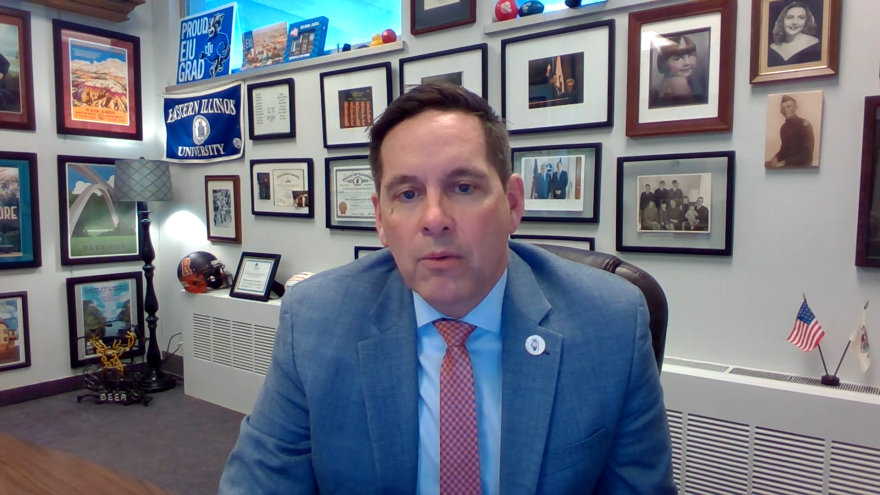Next month, the Illinois House Redistricting Committee is set to hold a series of hearings to determine the direction the map redrawing process proceeds in. Lawmakers won't have census data until September, but are constitutionally required to complete the process by the end of June.
State Rep. Tim Butler of Springfield has been named as the Republican spokesperson for the redistricting committee. He's been an advocate for creating an independent commission to handle the process. He says that sort of proposal has received support on both sides of the aisle.
We spoke with Butler about his top priorities as the redistricting process gets underway.
What are the top priorities for you and your Republican colleagues as we begin this redistricting process in earnest?
We need a process that is transparent and open, and that means more than just having hearings around the state. It's a process that allows the public to have input. I am someone along with most of the members of my caucus who have supported the commission method, which, unfortunately, we've ignored here in Illinois, and I think that would be a great way to get better public input on the map making process that we go through every 10 years if we had greater involvement of the public themselves, and not letting the politicians sit behind closed doors and and draw the maps. I think beyond that, it's how do we reckon with the situation around the data and the delay in the decennial census data now until sounds like September, before we get the actual data that we need? A lot of questions around what data we're going to use if the Democrats decide to run a map early, and I think that will be, I mean, that's going to be a big part of the discussion, I think, this spring.
What are some of the other hurdles ahead?
Having a public input is important. I've seen where, like, the Senate Democrats are going to roll out a website where people can draw their own maps. Gee, that's great. But how are you going to have, you know, are you going to take that as a legislator, and actually draw maps based on that public input? You know, I'm skeptical that that's the role of that website. I think it's just an avenue for the Democrats to say, "Oh, hey, we're, we're asking for public input." But at the end of the day, I mean, and this has happened in a bipartisan manner over the decades. Either party sits behind closed doors, with their staff, with their attorneys, whereas if we went to a more open process, where we actually allowed people to to help make the decisions, we would have a process that is that is much better than we have today, I believe.
What do you hope to focus on in your new role? What are your priorities?
Our priorities are, No. 1, engaging the governor to make sure that he's true to his word about upholding fair maps. And yeah, there might be different definitions of fair maps, but I think everybody can agree with more public input, with more transparency, things like taking the political data out of the process, instead of using the political data to draw the lines would help create more fair maps. I think respecting everything that has been litigated, and there are standards through statute or litigation when it comes to minority participation and voting rights and things like that, those absolutely have to be represented in maps, we have to follow that. Beyond that getting away from these incredibly gerrymandered districts where people scratch their heads when they look at a map and wonder how this person is my representative when I live way down here, and they live way up there. And that's done for for one reason, and one reason only, and that's for political partisan advantage, to get them elected to the General Assembly, and that's not the way we should do it.
What role do you see Republicans playing in the redistricting process?
We're going to be very vocal in our, I think, holding the Democrats to some of the ideals we've talked about. There are, I believe, 32 members of the Democrat majority in the House who have actually voted for a constitutional amendment to create a redistricting commission, including the speaker himself voted for it a few years ago. We're going to raise great questions, I'm sure, about what data they are going to use if they're going to draw maps by the end of June. And beyond that, again, back to the governor. I mean, the governor has to be true to his word. One thing that that the governor could really engender support within the people of Illinois is coming through with his commitment that he's made to make sure that the remap process is fair and that we have fair maps going on.
What have you heard from colleagues on both sides of the aisle more recently when it comes to your proposal?
I think people support the commission process. I think there are many like-minded Democrats and Republicans that believe we've gone on for far too long, allowing someone like Mike Madigan to draw the maps in Illinois, and we've seen some great change in the state recently, and this is another avenue that I would ask my Democrat colleagues to say this is time for change. And if we work together to get that done, I think it's a possibility. And I think there's some Democrats privately who definitely agree with that, but unfortunately, you know, sometimes what people say in private isn't what they, what they vote on in public. This is going to be a process of engagement over the next several weeks and months. I look forward to it. And it's going to be something that I hope that we get on the other end better maps that are made much better than we do today.
There’s no subscription fee to listen or read our stories. Everyone can access this essential public service thanks to community support. Help fund your public media with a contribution to WCBU or WGLT.


